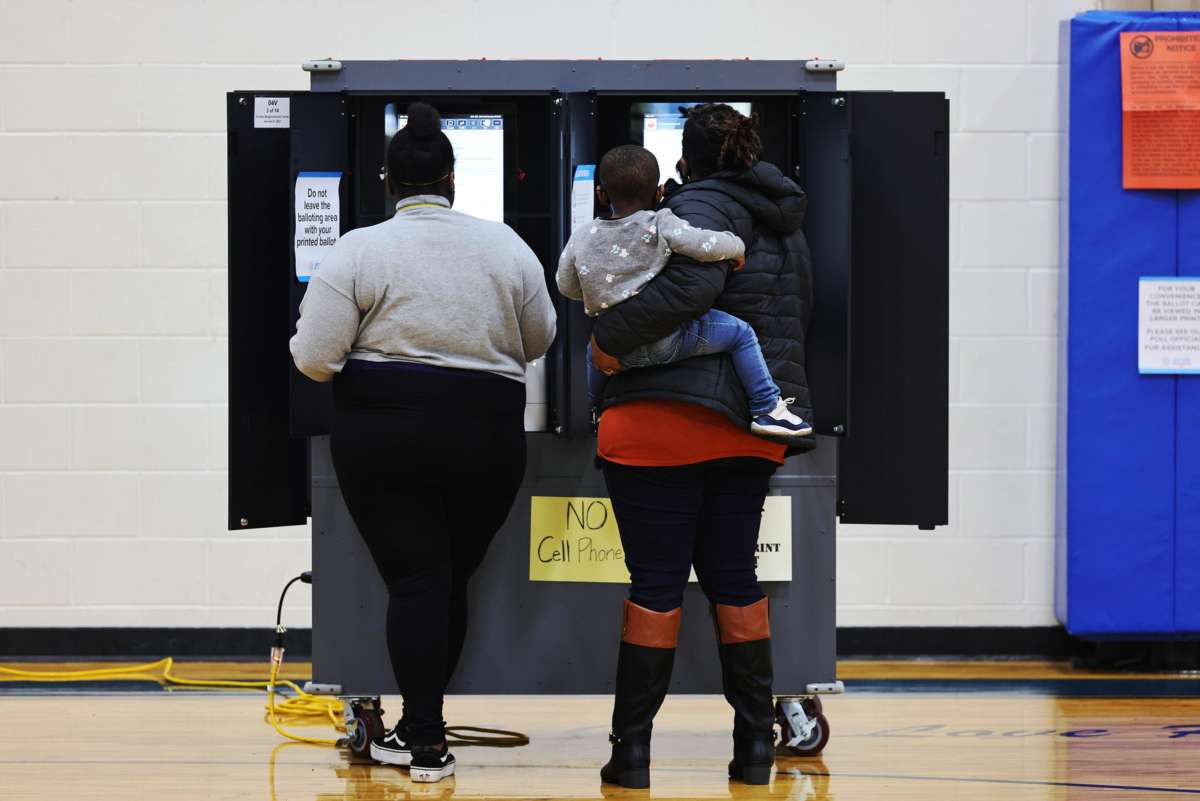Did you know that Truthout is a nonprofit and independently funded by readers like you? If you value what we do, please support our work with a donation.
A group of Senate Democrats has unveiled compromise legislation intended to strengthen voting rights throughout the U.S. while appealing to centrists in the party — but which includes a voter identification provision that has the potential to restrict those voting rights for millions.
Earlier this year, the For the People Act, an expansive voting rights bill that was proposed by Democrats, failed to garner support from centrists like Sen. Joe Manchin (D-West Virginia). However, he and other Democrats sought to find common ground on the issue, agreeing on principle that voting restrictions being proposed and passed by Republican state legislatures across the country needed to be addressed.
On Tuesday, that group of senators, led by Sen. Amy Klobuchar (D-Minnesota) and a number of cosponsors, including Manchin, Sen. Tim Kaine (D-Virginia), Sen. Jon Tester (D-Montana) and Sen. Raphael Warnock (D-Georgia), introduced their compromise bill, dubbed the Freedom to Vote Act.
The bill includes a number of provisions that were part of the For the People Act. It would, for example, make Election Day a federal holiday, require states to implement automatic voter registration systems, have each state offer same-day voter registration by the 2024 presidential election, and would force the disclosure of donations to dark money groups.
The bill would also set federal minimum standards for mail-in voting, and would seek to ban partisan gerrymandering by restricting political parties from drawing congressional district maps on their own. Voters would be guaranteed at least 15 consecutive days of early voting before Election Day, including two weekends preceding election day.
But notably, the bill would include a provision requiring voters in all states to present a photo ID in order to vote. This would expand the types of identification allowed for voting purposes and would give voters the opportunity to present both hard copy and digital versions of their IDs in order to receive a ballot — a move that would reduce the burden in some states that already have such restrictions, but would increase disenfranchisement in others where it’s not yet required.
In a statement on Tuesday, Manchin defended the need for the bill to include an ID requirement.
“As elected officials, we also have an obligation to restore [people’s] faith in our Democracy, and I believe that the commonsense provisions in this bill — like flexible voter ID requirements — will do just that,” he said.
Thirty-five states currently require identification in order to vote, with few, if any, alternatives for those who don’t have IDs to still partake in the democratic process. Right now, more than 21 million individuals who would otherwise be eligible voters do not have access to the type of IDs required to vote — and that number could rise if more states are forced to require identification prior to voting. Marginalized communities are hit hardest by the requirements, particularly people of color.
What’s more, such requirements are a solution in search of a problem. Various studies have demonstrated that in-person voter fraud is rare, and this one from 2014 showcases how, out of more than 1 billion ballots cast over a 15-year period, there have only been 31 cases of fraud that could have been prevented with an ID.
Beyond the disagreements surrounding the bill’s voter ID requirements, its chances of passing in the Senate are still slim-to-none. Republican senators are likely to filibuster the bill — and as Manchin is steadfast in his opposition to filibuster reform, this is an outcome that would effectively destroy the chance of a voting rights bill of any kind being passed by the current Congress.
A terrifying moment. We appeal for your support.
In the last weeks, we have witnessed an authoritarian assault on communities in Minnesota and across the nation.
The need for truthful, grassroots reporting is urgent at this cataclysmic historical moment. Yet, Trump-aligned billionaires and other allies have taken over many legacy media outlets — the culmination of a decades-long campaign to place control of the narrative into the hands of the political right.
We refuse to let Trump’s blatant propaganda machine go unchecked. Untethered to corporate ownership or advertisers, Truthout remains fearless in our reporting and our determination to use journalism as a tool for justice.
But we need your help just to fund our basic expenses. Over 80 percent of Truthout’s funding comes from small individual donations from our community of readers, and over a third of our total budget is supported by recurring monthly donors.
Truthout has launched a fundraiser, and we have a goal to add 273 new monthly donors in the next 72 hours. Whether you can make a small monthly donation or a larger one-time gift, Truthout only works with your support.
